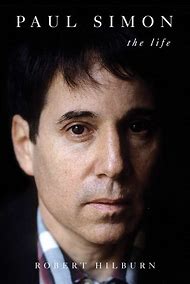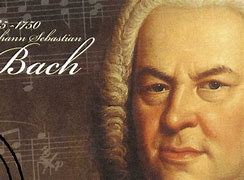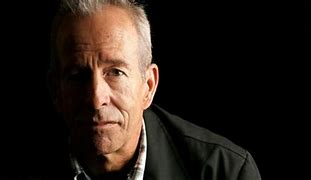INTEROGATING THE QUESTIONERS: part three of our five piece Paul Simon special
INTEROGATING THE QUESTIONERS
by Norman Warwick
When Paul Simon wrote — in Simon & Garfunkel’s 1965 breakthrough hit The Sound of Silence — that “the words of the prophets are written on the subway walls/And tenement halls,” he made a call to our collective conscience that resonates just as powerfully today as it did during its long moment on the pop charts.

So reckoned Matt Damsker in his December 2019 review in USA Today of a then new biography of Paul Simon, written by Robert Hilburn.,
Among sixties folk-rock bards who matured and endure as global singer/songwriters, Simon stands in the front rank, setting as high a bar for musical quality and poetic vision as any. His on-going success has been flecked with failure, youthful doubt and adult disappointment, and now we have a worthy portrait of the artist to put it all in perspective.

Matt Damsker described Paul Simon: The Life (Simon & Schuster, 448 pp.,) as ´a straight-shooting tour de force by Robert Hilburn, the former pop critic for the Los Angeles Times and author of an acclaimed 2013 Johnny Cash biography. Famously private, Simon reportedly resisted countless offers for his story until he read the Cash book, after which he gave Hilburn access and full editorial control´
It makes sense that Simon would trust Hilburn, a writer who doesn’t go for lurid detail, over-analyse or indulge in critical preening and preciosity. Like Simon, Hilburn’s passion is music, and he makes it clear that Simon’s is very much a life in and of music — a drive for perfection. As Hilburn tells it, Simon inherited his rigour from his musician father, Lou, who was stingy in his praise of Paul’s early song-writing efforts, just as Paul is a candidly tough judge of the musical aspirants he encounters.
Hilburn’s nuanced attention to the dynamics and the substance of Simon’s artistry is evident throughout.

We learn where memoir turns to message in his lyrics (´When you’re weary, feeling small´ is, for example, the confessional nudge that sends Simon’s great hymn, Bridge Over Troubled Water toward its affirmation) and we learn countless, often surprising details of his music-making: how he wed the melody line of a Bach chorale to the words of American Tune, or the obsessive studio wizardry that made such folk-pop anthems as The Boxer rival the ambitiousness and sweep of The Beatles.
Hilburn’s reportorial skill takes us on a complex journey, starting with Simon’s birth in 1941 and his middle-class rooting in Queens, N.Y., where he and a childhood friend, Art Garfunkel, inspired by the Everly Brothers, harmonized well enough to catch the ears of Manhattan producers. They enjoyed a modest hit record, Hey Schoolgirl, in 1957, as Tom and Jerry.
It would take another decade, though, for the multi-million-selling triumphs of Simon & Garfunkel’s heyday, followed by the Simon solo albums that yielded such hits as Fifty Ways to Leave Your Lover, Me and Julio Down By The Schoolyard, and the pioneering, pop-expanding world music of Graceland, for which Simon journeyed to South Africa in the 1980s to collaborate with local musicians.
In doing so, he sparked controversy among anti-apartheid activists, while bringing great African musicians such as Ladysmith Black Mambazo to the wider world. Simon’s high-profile failures — from his star turn in the film One-Trick Pony to the Broadway debacle of his musical, The Capeman — are just as fully delineated.
Hilburn weaves together the turbulent decades and quiet personal drama of Simon’s story — how his self-consciousness about his short stature (he’s 5-foot-3) drives him to tower above the pop competition, while his relationships and three marriages have often coexisted uneasily with his dedication to his art.
And though he launched his lengthy Homeward Bound: The Farewell Tour on May 16 a couple of years ago at Rogers Arena in Vancouver, British Columbia, in part to raise money for a number of worthy, Earth-conserving causes, Hilburn makes clear nothing forced Simon, now 79, into retirement.
Ultimately, he’s a man at peace with his complicated past, and his honoured present, and Hilburn does thorough justice to this American prophet and pop star.

Pop music writer Randy Lewis and pop music critic Robert Hilburn worked together at the New York Times for a quarter-century before the latter retired in 2006.
They sat down to talk about Hilburn’s latest book, “Paul Simon — The Life,” just prior to its publication by Simon & Schuster and just ahead of Simon’s farewell tour concerts at the Hollywood Bowl in 2016.
This is Hilburn’s third book since leaving The Times, and follows Johnny Cash — The Life (Little, Brown & Company, 2013).
You chose Johnny Cash as the subject of your first biography. Why Paul Simon?
When I first went to the L.A. Times in 1970, the question I had was “Who should I write about?” When I began to interview people from the ’60s, my first question was always “What was your favorite record?” They would always say Elvis Presley, Chuck Berry, Jerry Lee Lewis, Little Richard and maybe somebody else.
Then when I started interviewing people from the ’70s generation, and asked “What was your first record — who influenced you?” it was always the Beatles, the Stones, Bob Dylan, maybe somebody else — and Elvis Presley, Jerry Lee Lewis, Chuck Berry and Little Richard.
So I thought, maybe that’s what you do — you don’t try to follow who’s No. 1 every week, because that’s often somebody maybe nobody cares about. So I’m going to try to think of the artists who, ten years from now, the musicians are going to say, and the fans are going to say, “That’s the person who was important.”
Still, a number of artists could fit that description.
While I was writing the Cash book, I saw Simon at the Henry Fonda Theatre across from the Pantages [in Hollywood]. He was doing the So Beautiful Or So What tour [in 2011]. I listened to that album and I thought, (it was a great album) I love the song Questions For The Angels. I was thinking, who else, still active today, from the sixties is writing music that can stand up to their earliest, best stuff. Paul McCartney can’t, Brian Wilson can’t, Joni Mitchell can’t. Even Dylan — I’m not sure.
So after the Cash biography, I tried to think of who might be the best songwriter I can think of that would make an interesting book, and who would tell me about the whole issue of artistry: how artistry comes about and how you have to protect it. There’s the issue of fame: Look at Elvis — he was destroyed by fame and womanizing and drugs and stuff. All these artists have these [hurdles]: marriage, divorce, changes in public taste, laziness, running out of talent.
That’s why I talked to people like Quincy Jones and Allen Toussaint, people who have worked with a lot of great talent, to see what characteristics they found [in Simon’s work]. And again, I thought Paul is so articulate, this would be fabulous. He could tell me about the songs.
You had Simon’s co-operation — something he’s never granted any other biographer — but you retained final approval. How did that sit with Simon?
There was this huge thing early on — in the second month, third month, fourth month. He said, ´If you’re going to London, here are some people you ought to talk to´ and he had a whole list of names. He had people he had his secretary send notes to saying Hilburn was going to be calling them. But then he said to me, ´Now Kathy Chitty [his girlfriend during his early years living in England] is off limits´. And I thought, ´Here we go´.
I waited maybe five minutes — this was in a series of emails. I thought (about) what to do, feeling I couldn´t let this go any farther. So I said, ´Paul, I understand your concern and respect for Kathy and you don’t want to invade her life. But nobody can be off limits. If I’m talking to a reporter, and they ask how come I didn’t talk to Kathy Chitty I’ve gotta be honest and say ´Because she was off limits´. That can’t work, and it puts the whole book in question´.
I told him, ´You don’t have to help me find her. I’m not asking you to have your secretary contact her. But if I find her, and she wants to talk, you have to be OK with it.´ Twenty seconds go by. Then he says, he understands. That really set the tone, and he never violated that.
He often comes across as a sober, even sombre guy, yet there is a lot of subtle humour in his songs. How did his sense of humour come out during your time with him?
Insert photo He and his son are big baseball fans and they have the All-Fish Team — all-time players with fish names [Mike Trout, Jim “Catfish” Hunter]. One day he said, ´Of course, one of my favourite players on our team is Minnow Miñoso´. I’m thinking, ´No, Paul, it’s not Minnow Miñoso, it’s Minnie Miñoso´ [of the Negro League and the Chicago White Sox].
I was shaving the next morning, and I realized, (he had been joking). It’s subtle like that — he doesn’t set it up. I sent a note back to him and said, ´That was a joke, wasn’t it?” ´
He sent the word ´smile´ back.
But he does have a reputation for being aloof.
He’s had this reputation of being prickly, kind of a stuck-up guy. Even in the book, he says that when he and Edie Brickell, the singer-songwriter he married in 1992, first met she said, ´I heard you weren’t a very nice guy´, and he replied, ´No, I never meant to be a bad guy, I try to be nice.´ But he’s so focused.
That’s the thing people don’t understand: If Bob Dylan is sitting here, and you sat down with him and started talking, he wouldn’t sit there and say, “Hey, how ya doin’!” He’s got his own world. And Paul, if he’s thinking about a song, he’s not going to talk to you; Neil Young, he’s not going to talk to you. Now Bruce [Springsteen], he would try to talk to you. Bono would try to talk to you.
But some of these guys are just so into their world. I remember I was doing an interview with Neil Young one time, driving around his big ranch up there [in Northern California], and he said, ´“I write a lot of songs in the car´, I said, “What if you start writing a song now?´ He said, ´The interview would be over´. That’s what they are. That’s their artistry. It’s the focus, the obsession they have.
Speaking of artistry, you spend as much or more time in the book examining his music as you do raking over the details of his private life. You don’t gloss over his tempestuous relationship with Art Garfunkel, or his celebrity marriages to Carrie Fisher and more recently singer-songwriter Edie Brickell.
I think of it as two train tracks going in [parallel]: You’ve got to tell the personal story, because that’s what a biography is. But I think what’s important — beyond the personal story, which is essential — you’ve got to build on that and tell why he’s important. That’s the art part. And it went deeper into the art part than you almost ever see in a biography because, again, I wanted to stress the significance of it — why he’s remembered: those songs.
When you think of all these songs he wrote … it’s almost like I wanted it to be a case study in song-writing. But I didn’t want to do it to the exclusion of his private life.
So a casual fan will pick it up for the story. But for the person who wants to know about his significance and about the whole process of song-writing, that’s the second train. I’m fascinated by both of them — but the second train is what gives the book its significance.
Paul Simon has been the subject of controversy over the years — especially his run-in with the African National Congress over charges that he violated a cultural boycott of South Africa when he collaborated with musicians there for his Graceland album while apartheid was still in effect.
Graceland is the significant thing, and his philosophy is he doesn’t think anybody’s got the right to tell [an artist] what you can do. His view was, ´The ANC is a political party. I don’t want the Democratic Party or the Republican Party [here] telling me what I can do. I don’t want to ask their permission´. That was in essence what he said. He was defending artistry — he even wrote a column in the New York Times about that.
I don’t try to make his case, but he would say, ´That’s what artists do: You fight battles; you’re going to find record company presidents who don’t like what you do and try to change you.
You’re going to find all kinds of [obstacles] and you’ve got to fight through that´. Whether it’s writing a song and not giving up, in his mind he was justified. He talked to Quincy Jones, he talked to Harry Belafonte. He wasn’t unaware of the potential for problems. But the musicians wanted to work with him, and that was fine. So I think he’s pleased with that chapter [of his life]. He thinks he did the right thing, and I think he did the right thing.
One of my favourite sections is the one where he talks about writing Darling Lorraine, which he considers one of his best songs. It’s fascinating when the man who wrote it says he was surprised when the song about two people long into their relationship takes an unexpectedly dark plot turn.
That’s the big thing I learned: He writes in an unusual way. He doesn’t pick a theme and write about it; he plays the guitar until something resonates in him. Then he tries to figure out what that feeling is and write about that, taking one line at a time, until he discovers what he’s writing about. That’s the discovery.
He said when he was writing [the song] Graceland — that line [emerged] that just took the breath out of me: She said losing love is like a window in your heart / Everybody sees you’re blown apart. Those things come out. It’s partially subconscious.
That’s why he left Simon & Garfunkel. He was probably burned out by the seventies. He knew he had done all he could with those three [fundamental rock-pop] chords, so he set out to educate himself about other kinds of music so he could make more music: gospel music, Latin music, Cajun music, South African music — something else that would inspire him.
Did you reach a conclusion about how he has continued to make music that compares favourably to his early output?
Fame never became more important, money never became more important, nothing became more important to Paul Simon than his music. And for much of his life he suffered because of that; his relationships suffered. Gradually, after Graceland, he started opening up his life, and with his marriage to Edie, now he’s found a balance.
Follow @RandyLewis2 on Twitter.com
For Classic Rock coverage, join us on Facebook




Leave a Reply
Want to join the discussion?Feel free to contribute!